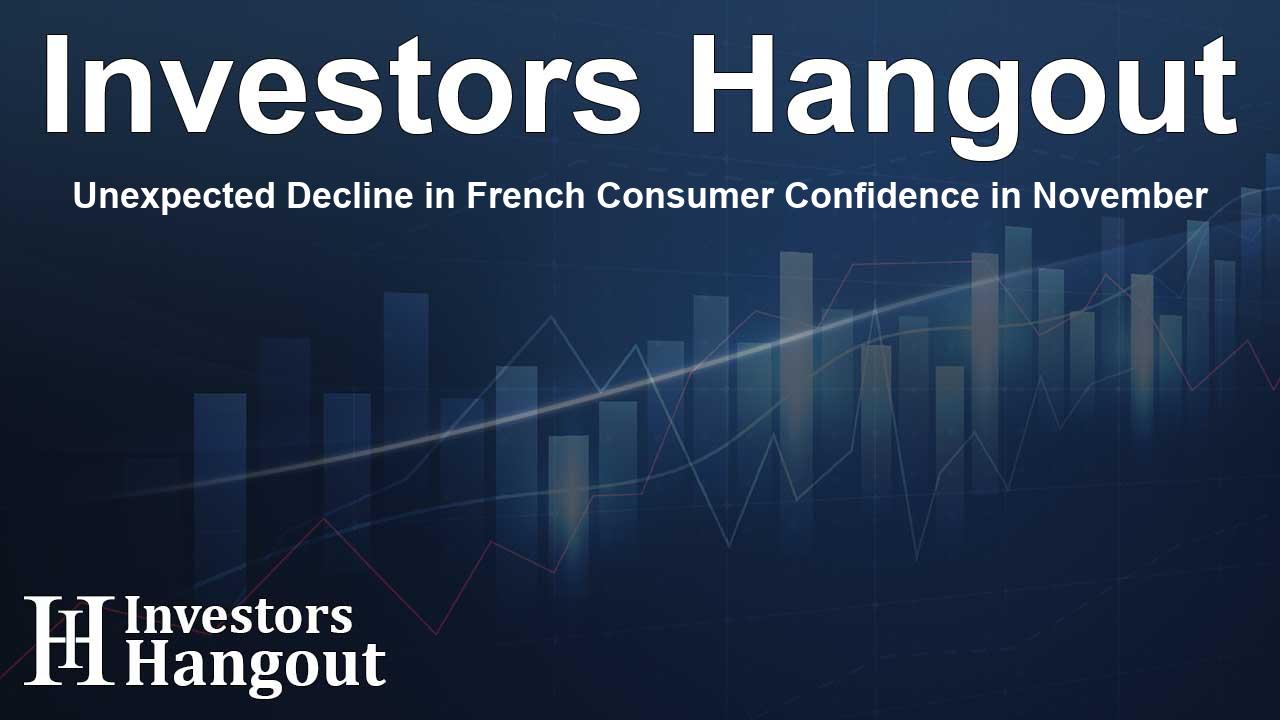Unexpected Decline in French Consumer Confidence in November

Unexpected Decline in Consumer Confidence in France
In an unexpected twist, France's consumer confidence index experienced a notable drop in November. This decline has been primarily attributed to household concerns regarding rising unemployment rates, as highlighted by the latest survey results released by INSEE.
Understanding the Impact of the Confidence Index
The consumer confidence index fell to a score of 90, a decrease from the revised figure of 93 recorded in October. This shift in consumer sentiment reflects significant concerns among households about the stability of their financial situation and job security.
Economic Expectations
Economists had anticipated a more optimistic outlook, projecting that consumer confidence would hold steady at around 93 points for November. The actual figures falling short of these expectations show a shift in how consumers perceive the economic climate.
Factors Contributing to the Decline
Several underlying factors contribute to this decline in consumer confidence. Rising unemployment fears point to broader economic uncertainties that can affect spending habits and overall economic performance.
Household Fears and Market Reactions
As households increasingly become concerned about job security, their spending behavior tends to tighten. This phenomenon can lead to reduced economic growth, as consumer spending is a significant driver of economic activity. Such anxiety reflects a considerable shift from previous consumer confidence, where optimism prevailed despite underlying economic challenges.
Potential Ramifications for Economic Policy
This downturn in consumer confidence may prompt policymakers to reassess their strategies moving forward. The falling confidence levels could lead to discussions around stimulating the economy to alleviate household concerns about unemployment and financial security.
Looking Ahead
As we've seen, the landscape of consumer confidence can change rapidly, influenced by various economic indicators and global events. Policymakers, economists, and stakeholders will need to monitor these trends closely to gauge the potential impact on the economic recovery and future policy measures.
Frequently Asked Questions
What does the consumer confidence index indicate?
The consumer confidence index measures how optimistic or pessimistic consumers are regarding their financial prospects and the overall economic situation.
Why did the French consumer confidence index drop?
The decline was mainly due to households' increasing fears about unemployment and economic uncertainties.
How does consumer confidence affect the economy?
Higher consumer confidence typically leads to increased spending, which fuels economic growth, while lower confidence can result in reduced spending and slower growth.
What should policymakers do in response?
Policymakers may need to implement measures to stimulate the economy and boost consumer confidence, such as job creation initiatives or financial assistance programs.
Is this decline a sign of a recession?
While a drop in consumer confidence can be a warning sign of economic troubles, it does not automatically mean a recession is imminent. It requires further analysis of economic indicators.
About Investors Hangout
Investors Hangout is a leading online stock forum for financial discussion and learning, offering a wide range of free tools and resources. It draws in traders of all levels, who exchange market knowledge, investigate trading tactics, and keep an eye on industry developments in real time. Featuring financial articles, stock message boards, quotes, charts, company profiles, and live news updates. Through cooperative learning and a wealth of informational resources, it helps users from novices creating their first portfolios to experts honing their techniques. Join Investors Hangout today: https://investorshangout.com/
Disclaimer: The content of this article is solely for general informational purposes only; it does not represent legal, financial, or investment advice. Investors Hangout does not offer financial advice; the author is not a licensed financial advisor. Consult a qualified advisor before making any financial or investment decisions based on this article. The author's interpretation of publicly available data shapes the opinions presented here; as a result, they should not be taken as advice to purchase, sell, or hold any securities mentioned or any other investments. The author does not guarantee the accuracy, completeness, or timeliness of any material, providing it "as is." Information and market conditions may change; past performance is not indicative of future outcomes. If any of the material offered here is inaccurate, please contact us for corrections.